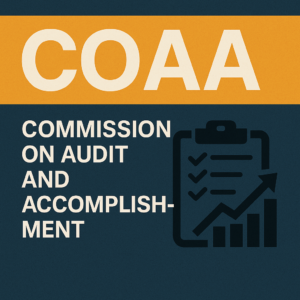By RAFFY GUTIERREZ
It’s a tired line in every government agency’s defense: “Cleared naman kami ng COA.” And just like that, the illusion of accomplishment is sold. But if there’s one thing tech, data, and modern governance have taught us, it’s this: compliance does not mean success. You can tick all the boxes and still get nothing done.
That’s why it’s time to evolve. The Philippines doesn’t just need a Commission on Audit (COA) anymore — we need a Commission on Audit and Accomplishment (COAA). A bold yet logical upgrade in how we measure government performance.
Here’s the uncomfortable truth: COA only tells us if the money was spent legally and documented properly. That’s all. Did they have receipts? Were procurement rules followed? Were funds liquidated? If yes, COA clears them.
But what happens if ₱50 million was spent on a bridge that leads to nowhere? Or if an agency spent ₱20 million on a digital hub that no one uses because there’s no internet? Cleared pa rin. Because from COA’s perspective, they followed the process — kahit palpak ang resulta.
This is a tech issue at its core. We are in the age of data dashboards, metrics-based governance, and real-time reporting. Yet our national audit system remains stuck in a paper-trail mentality. If we truly want a responsive, efficient, and accountable government, then audits must evolve from “how money was spent” to “what was actually achieved.”
Imagine a future where every government agency isn’t just required to submit financial reports, but also impact reports — quantified, verified, and independently evaluated. Where funds aren’t cleared just because they were documented, but because they delivered real outcomes.
That’s what the COAA can be. Not just auditing cash flows, but auditing completion, community use, and sustainability. Not just tracking “inputs” and “outputs,” but truly measuring outcomes.
Let’s break that down:
Audit = Were the funds spent correctly?
Accomplishment = Did the project actually solve the problem?
Right now, a department can blow through a ₱100 million budget with perfect documentation and zero public impact — and still claim they succeeded. In any serious corporate setting, that would get a CEO fired. In the Philippine bureaucracy? It gets you reappointed.
If we want change, we need metrics beyond liquidation. We need to ask:
Was the water system used by the community?
Did the e-governance app lower transaction time?
Is there less flooding after the flood control project?
Technology already gives us the tools to track these things. We can geo-tag infrastructure, use QR systems to verify distribution, crowdsource public feedback, and integrate AI for performance scoring. The only thing missing is political will.
A rebranded COAA could be that missing link — a body empowered to go beyond receipts and dig into results. It won’t be easy, and of course, it will be resisted. Because it’s easier to hide behind paperwork than actual work. But this is exactly why the push must start now.
The best government is not the one that just spends. It’s the one that delivers.
So next time an agency says, “Cleared kami ng COA,” let’s ask: “Yes, but what did you actually accomplish? Did it make a real difference or everything you did was only good on paperwork and documentation?”
———-
Rafael “Raffy” Gutierrez is a veteran Technology Trainer with over 25 years of experience in networking, systems design, and diverse computer technologies. He is also a popular social media blogger well-known for his real-talk, no-holds-barred outlook on religion, politics, and philosophy.




